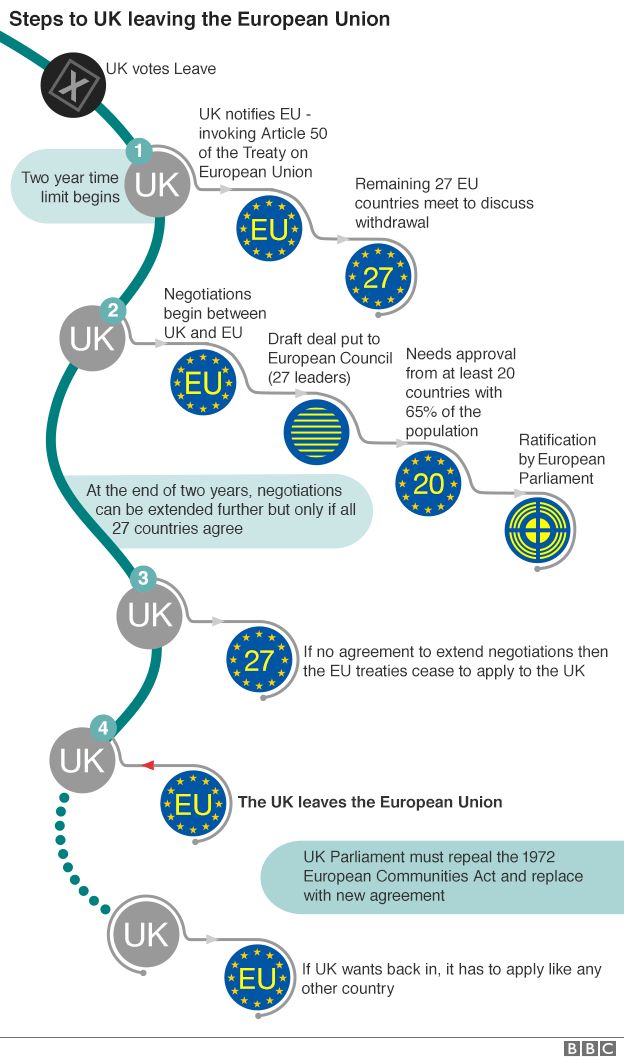
This article is more than
9 year oldA central figure in the Leave campaign, UK Independence Party (UKIP) leader Nigel Farage, was booed, called a liar and accused of using "Nazi propaganda".
But in his speech Mr Farage told parliament members "you as a political project are in denial".
He said hardly any of them had ever done a proper job in their lives, or created one.
The parliament was holding a special session ahead of a meeting later on Tuesday between EU leader and UK Prime Minister David Cameron - the first such meeting since the UK's vote.
Mr Cameron is stepping down, saying it will be up to his successor to trigger the formal method by which the country leaves the EU, and to conduct exit negotiations.
The European Parliament voted in favour of a motion urging the UK to do so immediately, by triggering Article 50.
Opening the session in parliament, European Commission President Jean-Claude Juncker said the British government should "clarify" its position.
Mr Juncker said the will of the British people must be respected, prompting shouting and clapping from Mr Farage.
"You were fighting for the exit, the British people voted in favour of the exit. Why are you here?" Mr Juncker responded, to applause from others in parliament.
He also accused Mr Farage of lying about using the UK's EU contributions to fund the country's National Health Service, saying he had "fabricated reality".
Others went much further. Belgian ex-PM Guy Verhofstadt, and leader of the liberal group in the European parliament, said Mr Farage had used "Nazi propaganda" in the campaign, referring to a poster showing lines of refugees.
In a veiled condemnation of Leave campaigner Boris Johnson, and likely contender to be the next British Prime Minister, Mr Verhofstadt attacked "the selfishness of one man prepared to do anything to become the prime minister of the UK".
This was a stormy and deeply emotional debate, with accusations and counter-accusations of lying.
Britain's vote to leave the EU has divided and shaken the European Parliament. This is a watershed moment.
Many MEPs expressed sadness at losing the UK. There was a standing ovation for Britain's outgoing Commissioner, Lord Hill.
But there was also a strong sense of defiance, as well as concern for the future. There were calls for unity, for reform, and the need to connect to Europe's citizens.
For the Eurosceptic groups, this was a sweet moment of victory. Something that once appeared almost impossible has become reality.
Manfred Weber, the chairman of the European People's Party group, said: "The times of appeasement are over. We have to stand up for our European project."
"Apologise to the British, shame on you," he told Mr Farage, adding: "Stop this populist Brussels bashing."
Hitting back, Mr Farage told parliament that they were "in denial".
"We now offer a beacon of hope to democrats across the European continent," he said. "The UK will not be the last member state to leave the EU."

France's National Front leader Marine Le Pen, who wants her country to hold a referendum on EU membership, told MEPs to "put away those sulky looks and rejoice in the emancipation" of the British people.
Meanwhile in a speech to the German parliament, Chancellor Angela Merkel said that the EU was strong enough to survive without the UK.
She said she respected the result and warned the bloc would not tolerate British "cherry-picking" when it came to negotiations.
"There must be and will be a noticeable difference between whether a country wants to be a member of the European Union family or not," she said.
The BBC's Berlin correspondent Jenny Hill says the remarks are Mrs Merkel's toughest words yet, with concerns in the German government that others EU members could follow Britain's move.